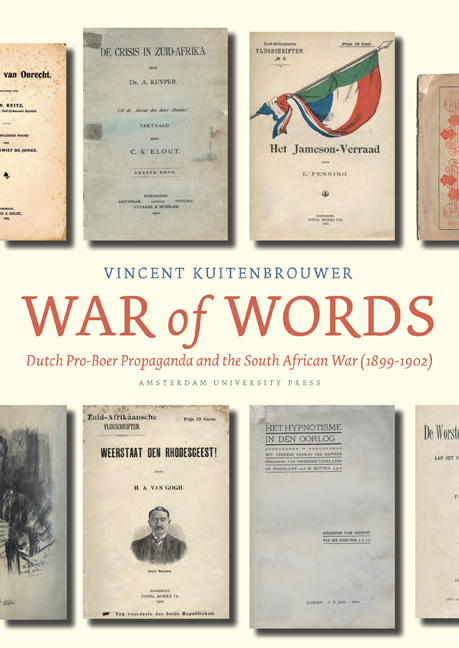Chapter 1 - ‘New Holland’ in South Africa? Building a Bridgehead Between the Netherlands and the Boer Republics
Published online by Cambridge University Press: 15 January 2021
Summary
Historians agree that several groups in the Netherlands suddenly (re-)discovered the Boers after the Transvaal War (1880-1881). Drawing on ideas of racial kinship, or stamverwantschap, there was much sympathy and enthusiasm for the so-called ‘cousins in South Africa’, which were expressed in many ways. The meaning of the pro-Boer movement, however, is subject to discussion, which is a reflection of its complex nature. On the one hand it can be argued that the Boers served as an example to people in the Netherlands, who took pride in their heroic struggle and saw it as a sign that the Dutch race had found new élan. As such, the ideology of stamverwantschap played a marked role in society at the end of the nineteenth century, which can be characterised as the ‘climax of civil culture’ in the Netherlands. But there were also overseas aspects to the pro-Boer movement. The main goal of the organisations that were established was to recruit emigrants for South Africa in order to assist in the development of the Boer republics and to strengthen their position against the British Empire. On the other hand, as many hoped, the existence of an independent state in South Africa where Dutch was spoken would mean that the influence of the Netherlands in that region would grow and lead to lucrative economic ties. Such sentiments were clearly reflected in a public letter written in 1886 by a number of intellectuals who asserted that the ties between the people in the Netherlands and the Boers were mutually beneficial. Looking at the pro-Boer movement as a whole, its domestic and international aspects prompt the question how it was related to ideas of imperialism and nationalism.
Some historians put much emphasis on the domestic aspects of the pro-Boer movement. Henk te Velde holds that the idealised image of the Boers had little to do with the principles of Dutch foreign policy but was instead a sign of the transformations taking place in domestic society and the changing political culture. In his study of Liberal nationalism, he argues that protagonists from this group were in search of unity and stabilisation at the dawn of the age of modern politics in the Netherlands, which was associated with increasing rivalry amongst the emerging parties.
- Type
- Chapter
- Information
- War of WordsDutch Pro-Boer Propaganda and the South African War (1899–1902), pp. 35 - 64Publisher: Amsterdam University PressPrint publication year: 2012



